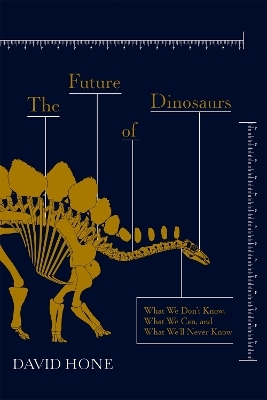
The Future of Dinosaurs
What We Don't Know, What We Can, and What We'll Never Know
Seiten
2024
Hodder & Stoughton (Verlag)
978-1-4736-9228-2 (ISBN)
Hodder & Stoughton (Verlag)
978-1-4736-9228-2 (ISBN)
Paleontologist Dr David Horne explores the frontiers of dinosaur discovery.
Discover the latest frontiers in dinosaur research with Dr David Hone.
Ever since we first started discovering dinosaurs in the early-1800s, our obsession for uncovering everything about these creatures has been insatiable. Each generation has made huge strides in trying to better our understanding of these animals and in the past twenty years, we have made more discoveries than in the previous two hundred.
There have been extraordinary advances in palaeontological methods and ever more dinosaur fossils promise a landslide of new data and huge leaps forward in our understanding of these incredible animals. Over time, we have been bale to look at the sizes and shapes of bones, we have identified patches of fossil skin, we have looked at footprints and bite marks and we've calculated mass estimates and walking speeds.
With surprisingly little data to work from, we can put together a picture of an animal that has been extinct for a million human lifetimes. But for all our technological advances, and two centuries of new data and ideas, there is stull much more we don't know. What parasites and diseases afflicted them? How did they communicate? Did they climb trees? How many species were there?
In The Future of Dinosaurs, palaeontologist Dr David Hone looks at the recent strides in scientific research and the advanced knowledge we've gathered in recent years, as well as what we hope to learn in the future about these most fascinating of extinct creatures.
Discover the latest frontiers in dinosaur research with Dr David Hone.
Ever since we first started discovering dinosaurs in the early-1800s, our obsession for uncovering everything about these creatures has been insatiable. Each generation has made huge strides in trying to better our understanding of these animals and in the past twenty years, we have made more discoveries than in the previous two hundred.
There have been extraordinary advances in palaeontological methods and ever more dinosaur fossils promise a landslide of new data and huge leaps forward in our understanding of these incredible animals. Over time, we have been bale to look at the sizes and shapes of bones, we have identified patches of fossil skin, we have looked at footprints and bite marks and we've calculated mass estimates and walking speeds.
With surprisingly little data to work from, we can put together a picture of an animal that has been extinct for a million human lifetimes. But for all our technological advances, and two centuries of new data and ideas, there is stull much more we don't know. What parasites and diseases afflicted them? How did they communicate? Did they climb trees? How many species were there?
In The Future of Dinosaurs, palaeontologist Dr David Hone looks at the recent strides in scientific research and the advanced knowledge we've gathered in recent years, as well as what we hope to learn in the future about these most fascinating of extinct creatures.
Dr David Hone is a paleontologist, writer and lecturer at Queen Mary, University of London. His research focuses on the behaviour and ecology of the dinosaurs and their flying relatives, the pterosaurs. He writes about dinosaurs for The Guardian, the Telegraph, National Geographic and The Huffington Post.
| Erscheinungsdatum | 28.08.2024 |
|---|---|
| Sprache | englisch |
| Maße | 128 x 196 mm |
| Gewicht | 191 g |
| Themenwelt | Sachbuch/Ratgeber ► Natur / Technik ► Naturwissenschaft |
| ISBN-10 | 1-4736-9228-8 / 1473692288 |
| ISBN-13 | 978-1-4736-9228-2 / 9781473692282 |
| Zustand | Neuware |
| Haben Sie eine Frage zum Produkt? |
Mehr entdecken
aus dem Bereich
aus dem Bereich
Die glänzenden und die dunklen Jahre der Physik 1895-1945
Buch | Softcover (2023)
Klett-Cotta (Verlag)
CHF 19,55
wie sie denkt, fühlt und Probleme löst
Buch | Hardcover (2024)
Folio (Verlag)
CHF 39,90


